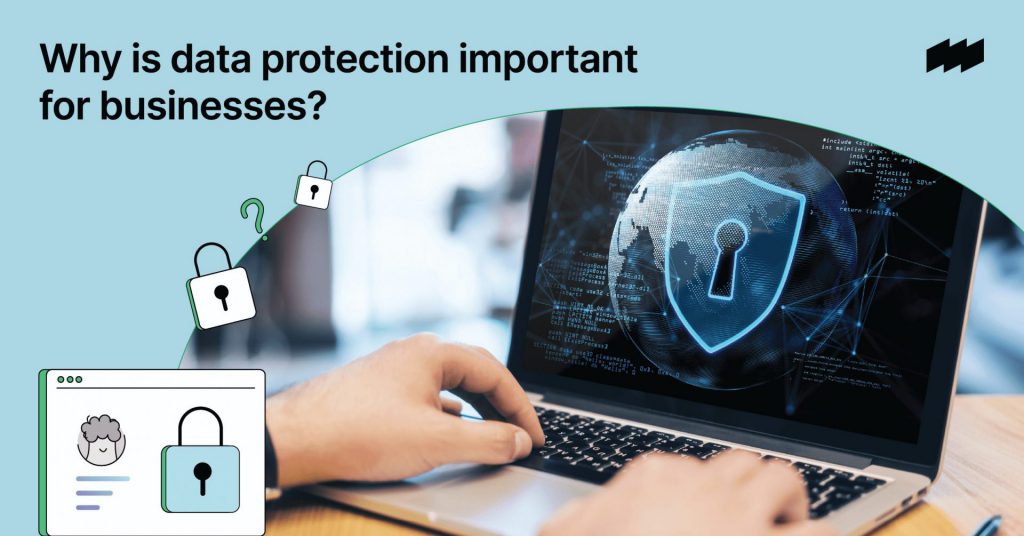Data is often called the “new oil,” the lifeblood that fuels the digital age. As we become increasingly interconnected, the importance of safeguarding this vital resource cannot be understated. For businesses, in particular, data protection has become a non-negotiable requirement. But what exactly does it involve, and why is it so crucial?
What is data protection?
Data protection is a multi-faceted approach that involves implementing technical, legal, and procedural measures to secure sensitive information from unauthorized access, alteration, or destruction. This data may include personal information, financial records, intellectual property, and other confidential business-related material. Protecting this data is paramount to maintaining operational efficiency and your company’s reputation and legal standing.
What is the purpose of data protection?
The purpose of data protection is threefold.
- Security: To prevent unauthorized access to your data, keep it safe from potential cyber threats like hackers, phishing scams, and malware.
- Integrity: To ensure the accuracy and reliability of data throughout its lifecycle.
- Confidentiality: To guarantee that personal or sensitive information is accessible only by authorized personnel.
By achieving these objectives, businesses can maintain consumer trust, comply with legal standards, and operate efficiently without the looming threat of data breaches or fraud.
Why is data protection important?
Data protection is essential for safeguarding individuals’ privacy, preventing identity theft, ensuring trust in digital systems, and complying with legal and regulatory standards.
Credibility and customer trust
In an era where privacy concerns are at an all-time high, businesses cannot afford the reputational damage associated with a data breach. When customers know that you prioritize data protection, it builds trust, which is invaluable in today’s highly competitive market.
Legal consequences
Non-compliance with data protection regulations can lead to hefty fines, legal proceedings, and even the suspension of business operations. Since laws continually evolve, staying compliant is not just a one-time effort but an ongoing process. Moreover, adequate data protection also aids in maintaining a competitive advantage. In sectors where data serves as a cornerstone for operations, safeguarding it offers a distinct edge over competitors who may not be as diligent in their protection measures.
Business continuity
A single data breach can cripple operations, from freezing essential services to rendering valuable data useless. This may result in immediate and long-term revenue losses and potential legal liabilities.
Competitive advantage
Companies that excel in data protection often have a competitive advantage. They can assure clients, partners, and investors that their data-handling practices are above par, thereby attracting business relationships that can prove lucrative in the long run.
Intellectual property
For many businesses, intellectual property is often the most valuable asset. Effective data protection measures help safeguard these crucial assets, from patents and copyrights to proprietary business methods, thereby preserving the business’s unique value proposition.
Global operations
Businesses often find themselves involved in cross-border transactions in today’s globalized world. Effective data protection measures ensure that data can be safely transferred and stored across different countries in compliance with international laws and regulations.
How to improve data security
- Employee training: A well-informed team is your first line of defense. Train your employees on data protection best practices, such as password management and recognizing phishing attempts.
- Encryption: Utilize encryption algorithms to secure data both in transit and at rest.
- Regular audits: Continuously assess and update your data protection strategies as needed. Frequent audits can help identify vulnerabilities before they become critical issues.
- Multi-factor authentication (MFA): Implementing MFA adds an additional layer of security, requiring users to verify their identity through multiple means before gaining access to data.
- Regular software updates: Keeping your software up-to-date is crucial. Outdated software is a breeding ground for vulnerabilities. Constantly update your systems to patch any known security risks.
How to comply with data protection and privacy laws
Complying with data protection and privacy laws involves a series of steps tailored to the specific regulations of a jurisdiction, but here are some general best practices.
GDPR
General Data Protection Regulation (GDPR) is a European Union legislation that aims to protect the privacy of EU citizens. Compliance involves implementing specific data protection policies, conducting regular impact assessments, and having a precise consent mechanism for collecting personal information.
CCPA
The California Consumer Privacy Act (CCPA) is a state law offering similar protections to Californians. Among other things, it requires businesses to disclose their data collection practices and enables consumers to request the deletion of their personal information.
Set up your company and keep your data secure with Workhy
In the ever-evolving data security landscape, Workhy is your trusted partner, providing cutting-edge solutions tailored to your business needs. Whether you want to set up a company in the US, UK, or EU without residing or traveling there or require additional services such as tax ID number applications, online bookkeeping software, tax filing, and opening online bank accounts, we’ve got you covered. Workhy prioritizes your data protection and privacy so you can focus on growing your business, secure in the knowledge that your data is safe. For more details, visit us at Workhy.

